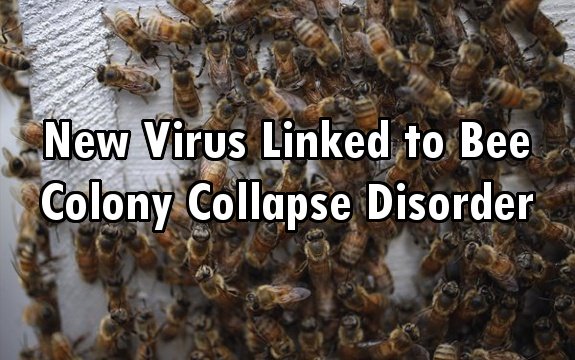Virus Spreads from Pollen to Bees, Possibly Contributing to Bee Colony Collapse


Viruses don’t usually cross from plant to animal, so fear of contracting such a virus is not usually of concern. But in an alarming event, a “rapidly mutating” virus has made the leap from plants to honeybees, and could be furthering the collapse of bee colonies.
According to the LA Times, tobacco ringspot virus (TRSV) is a pathogen that causes blight in soy. It’s spread by pollen, like only about 5% of plant viruses. Though bees deal in pollen like Monsanto deals in GMOs, they don’t typically get sick from whatever plant illnesses might be in the dust. In the case of tobacco ringspot virus, however, they have.
This is the first report of honeybees being sickened off of a pollen-born virus, but traces of the virus were found in every part of the bees scientists analyzed, except the eyes.
Farmers of some crops use cultivated bee colonies to pollinate their crops. The industry is valued at $14 billion annually. In California, the almond industry spends approximately $240 million every year to rent beehives and as the bee populations dwindle, the costs climb.
Scientists call the ringspot virus a “quasi-species”, acting in a way that bypasses the bee’s immune response. It works in much the same way of other recurring viral infections including avian flu and HIV.
Read: List of Foods We’ll Lose Without the Bees
“They have a high mutation rate,” said lead author of a recent study Yan Ping (Judy) Chen, a bee pathologist at the USDA Agricultural Research Service. “Because of their genetic diversity, we see a lot of host jumping.”
“I want to be cautious,” Chen added. “The cause of colony collapse disorder remains unclear. But we do have evidence that TRSV along with other viruses that we screen on a regular basis are associated with lower rates of over-winter survival.”
The fact is, there’s a lot scientists don’t know about TRSV, about the destruction of bee colonies, and about bees in general.
Pesticides are another likely contributor. In particular, a class called neonicotinoids, banned in Europe, have been blamed with suppressing the immune function of bees and increasing the survival rate and reproduction of viruses.
